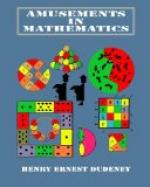A charitable gentleman, on his way home one night, was appealed to by three needy persons in succession for assistance. To the first person he gave one penny more than half the money he had in his pocket; to the second person he gave twopence more than half the money he then had in his pocket; and to the third person he handed over threepence more than half of what he had left. On entering his house he had only one penny in his pocket. Now, can you say exactly how much money that gentleman had on him when he started for home?
9.—The two aeroplanes.
A man recently bought two aeroplanes, but afterwards found that they would not answer the purpose for which he wanted them. So he sold them for L600 each, making a loss of 20 per cent. on one machine and a profit of 20 per cent. on the other. Did he make a profit on the whole transaction, or a loss? And how much?
10.—Buying presents.
“Whom do you think I met in town last week, Brother William?” said Uncle Benjamin. “That old skinflint Jorkins. His family had been taking him around buying Christmas presents. He said to me, ’Why cannot the government abolish Christmas, and make the giving of presents punishable by law? I came out this morning with a certain amount of money in my pocket, and I find I have spent just half of it. In fact, if you will believe me, I take home just as many shillings as I had pounds, and half as many pounds as I had shillings. It is monstrous!’” Can you say exactly how much money Jorkins had spent on those presents?
11.—The cyclists’ feast.
’Twas last Bank Holiday,
so I’ve been told,
Some cyclists
rode abroad in glorious weather.
Resting at noon within a tavern
old,
They all agreed
to have a feast together.
“Put it all in one bill,
mine host,” they said,
“For every
man an equal share will pay.”
The bill was promptly on the
table laid,
And four pounds
was the reckoning that day.
But, sad to state, when they
prepared to square,
’Twas found
that two had sneaked outside and fled.
So, for two shillings more
than his due share
Each honest man
who had remained was bled.
They settled later with those
rogues, no doubt.
How many were
they when they first set out?
12.—A queer thing in money.
It will be found that L66, 6s. 6d. equals 15,918 pence. Now, the four 6’s added together make 24, and the figures in 15,918 also add to 24. It is a curious fact that there is only one other sum of money, in pounds, shillings, and pence (all similarly repetitions of one figure), of which the digits shall add up the same as the digits of the amount in pence. What is the other sum of money?
13.—A new money puzzle.
The largest sum of money that can be written in pounds, shillings, pence, and farthings, using each of the nine digits once and only once, is L98,765, 4s. 31/2d. Now, try to discover the smallest sum of money that can be written down under precisely the same conditions. There must be some value given for each denomination—pounds, shillings, pence, and farthings—and the nought may not be used. It requires just a little judgment and thought.




